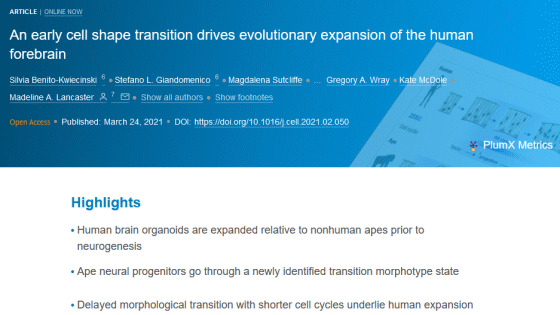Genes that develop the human brain more than other primates are identified

Much research has been done on the human brain, and in March 2021,
An early cell shape transition drives evolutionary expansion of the human forebrain: Cell
https://www.cell.com/cell/fulltext/S0092-8674(21)00239-7

To observe the development of human, gorilla, and chimpanzee brain tissue, the research team used
In the process of cerebral organoid formation, neural stem cells that form cells that differentiate into nerve cells appear, just like the actual brain. It is known that these neural stem cells become smaller as they mature, and that the later they mature, the more neurons are formed. In addition, previous studies have shown that mouse neural stem cells, which are less intelligent than primates, mature within hours.
The images below show the maturation of neural stem cells on days 3 and 5 from the start of cerebral organoid culture. Human brain organoid neural stem cells (left) have similar shapes on days 3 and 5, but gorilla brain organoid neural stem cells (right) mature and become smaller on day 5. You can see that it is.

From this, the research team said, 'Human neural stem cells mature more slowly than other primate neural stem cells. Therefore, many neural stem cells are formed, brain tissue becomes large, and brain capacity is also large. It is thought that it will be. ' In fact, if you check the pictures of the brain organoids 5 weeks after the start of culture of humans (left), gorillas (center), and chimpanzees (right), you can see that the human brain organoids are growing the most.

The research team is investigating the causes of changes in the maturation rate of neural stem cells depending on the organism. As a result, we discovered that a gene called

Furthermore, it was confirmed that suppressing the expression of ZEB2 in gorilla neural stem cells prolongs the maturation period of neural stem cells. The research team said, 'This experiment is conducted using cerebral organoids. Therefore, ZEB2 does not always work in the actual primatological brain in the same way.' It's an important step in explaining the difference in brain size between humans and other primates. '
Related Posts:







